Experiencing symptoms like a cough, congestion or a fever? The cause for common symptoms like these can be hard to pinpoint with so many overlapping symptoms. You could have a sinus infection, a common cold, COVID-19 or a combination of illnesses.
The key to understanding these illnesses is identifying the differences in symptoms and working with a medical professional for the best treatment options for you. Learn about the similarities, differences and recommendations for prevention and treatment from health care professionals.
Key Takeaways
Sinus infections, COVID-19 and the common cold share overlapping symptoms, but they’re caused by different viruses or bacteria and require different treatments.
A sinus infection is often associated with facial pain or pressure, thick nasal discharge and symptoms that last more than 10 days or worsen after initial improvement.
COVID-19 symptoms can vary widely but often include fever, fatigue and loss of taste or smell — features not common with colds or sinus infections.
While colds usually resolve on their own, sinus infections may need antibiotics if symptoms persist, and COVID-19 may require antiviral medications or additional care depending on severity.
What are the differences between a sinus infection, COVID-19 and a common cold?
To understand the differences between a sinus infection, COVID-19 and a common cold, it’s best to start with a definition of each illness.
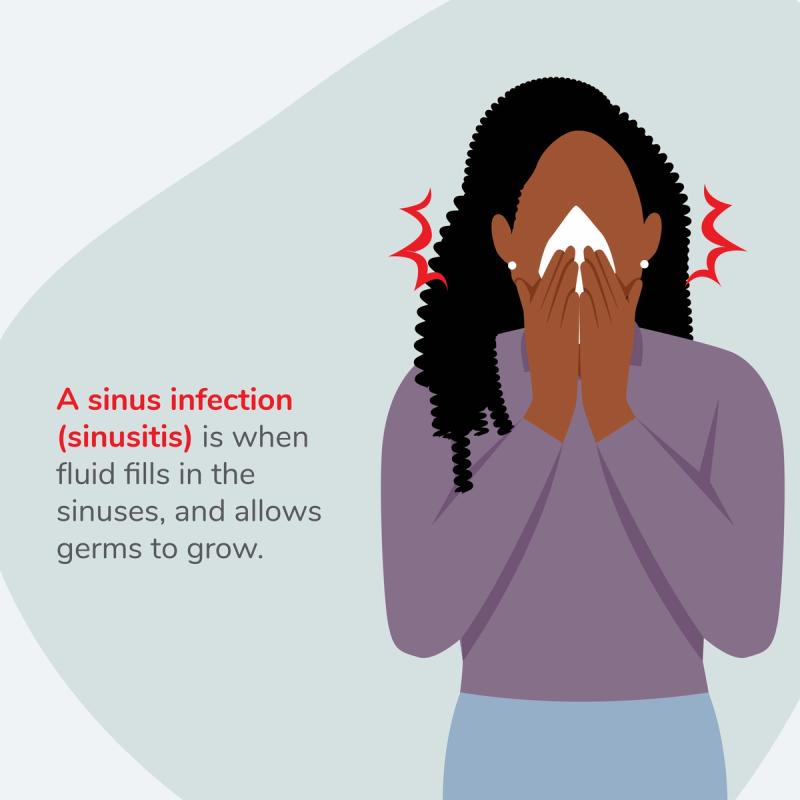
What is a sinus infection?
A sinus infection (sinusitis) is when fluid fills in the sinuses, air pockets of the face, and allows germs to grow. Most sinus infections are caused by a virus, but the condition can also be caused by bacteria or a fungus. Risk factors for developing a sinus infection include:1
A previous cold.
Smoking or secondhand smoke.
A weakened immune system from an illness or medication.
Structural issues with the sinuses, like nasal polyps.
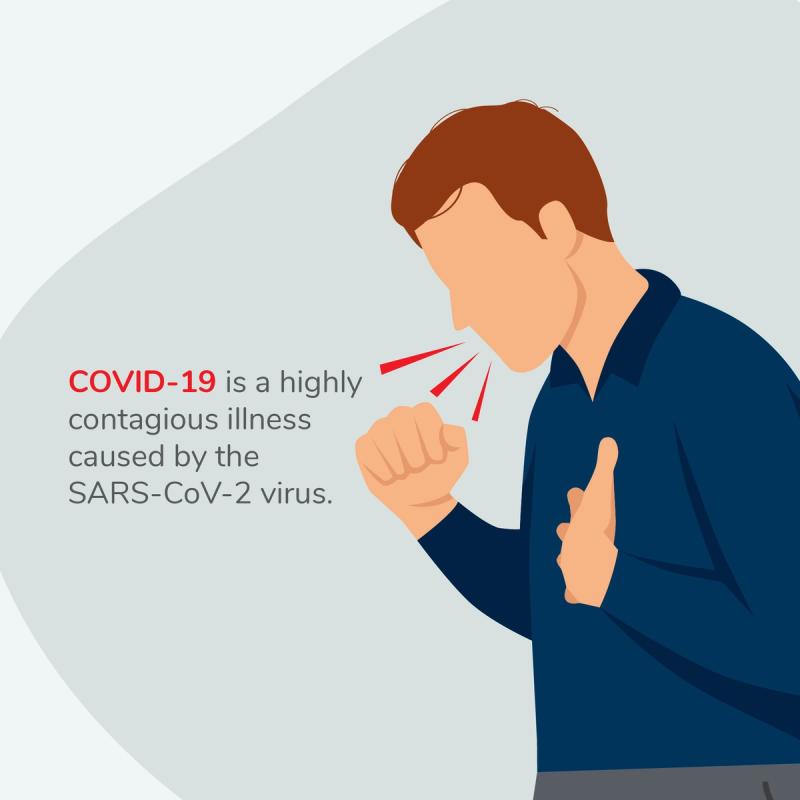
What is COVID-19?
COVID-19 (coronavirus disease 2019) is a highly contagious illness caused by the SARS-CoV-2 virus.2 It causes respiratory symptoms like fever, chills, and cough.3 Most people experience mild symptoms from COVID-19, but certain people are at a higher risk of serious complications, including the elderly and those who have:4
Sickle cell disease or thalassemia.
Serious heart diseases, such as heart failure, coronary artery disease or cardiomyopathy.
Chronic kidney, liver or lung diseases.
Cancer.
Type 1 or type 2 diabetes.
Weakened immune system from solid organ transplants or bone marrow transplants, some medicines or HIV.
Pregnancy.
Down syndrome.
Substance use disorders.
COVID-19 spreads when an infected person breathes, coughs, or sneezes out droplets and very small particles that contain the virus. These droplets and particles can be breathed in by other people or land on their eyes, nose, or mouth. In some circumstances, the virus particles may contaminate the surfaces they touch.5
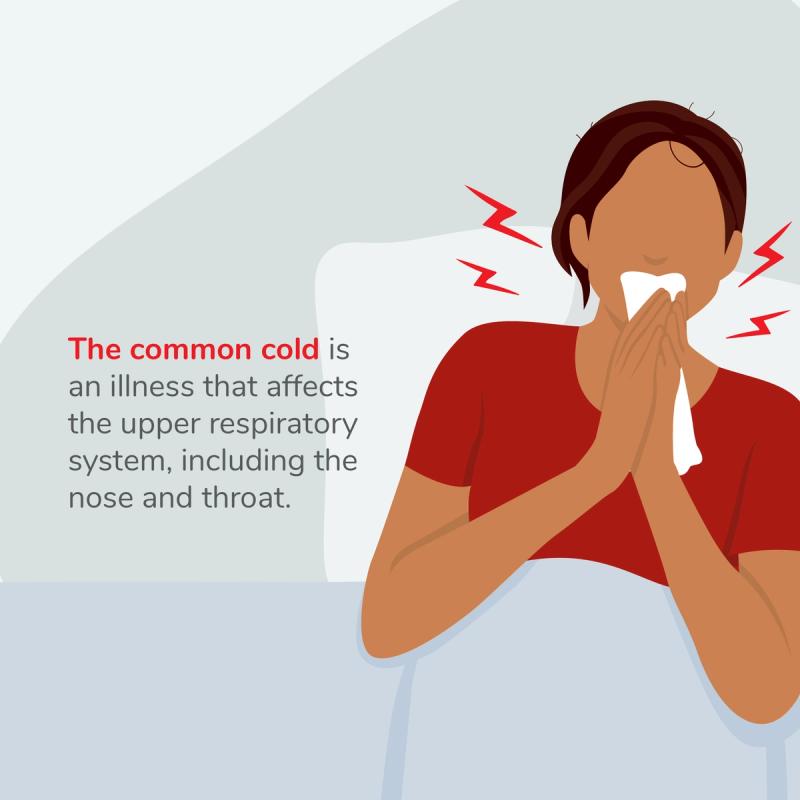
What is a common cold?
The common cold is an illness that affects the upper respiratory system, including the nose and throat. Most colds are caused by a virus, with rhinoviruses being the most common. Risk factors for developing a common cold include:6
Age. Infants and young children have a greater risk of colds than other people.
Weakened immune system.
Time of year. Both children and adults are more likely to get colds in fall and winter.
Smoking or being around secondhand smoke.
Exposure. Being in crowds, such as at school or on an airplane.
How do signs and symptoms compare for a sinus infection, COVID-19 and a common cold?
A sinus infection, COVID-19 and a common cold have overlapping and exclusive symptoms. Comparing symptoms can be a clue to what illness you may have.
Symptoms common between a sinus infection, COVID-19 and a common cold include:
Cough.
Fever.
Stuffy or runny nose.
Symptoms of a sinus infection include:7
Runny nose with thick, yellow or greenish mucus.
Postnasal drip down the back of the throat.
Stuffy nose and congestion.
Pain, tenderness, swelling and pressure around the eyes, cheeks, nose or forehead that gets worse when bending over.
Ear pressure.
Headache.
Aching in the teeth.
Changed sense of smell.
Cough.
Bad breath.
Tiredness.
Fever.
Symptoms of COVID-19 include:8
Fever or chills.
Cough.
Shortness of breath or difficulty breathing.
Fatigue.
Muscle or body aches.
Headache.
New loss of taste or smell.
Sore throat.
Congestion or runny nose.
Nausea.
Symptoms of a common cold include:9
Sneezing.
Stuffy nose.
Runny nose.
Sore throat.
Coughing.
Mucus dripping down your throat (post-nasal drip).
Watery eyes.
Fever (although most people do not have fever with colds).
Sinus Infection, COVID-19 and Common Cold Symptom Comparison Chart
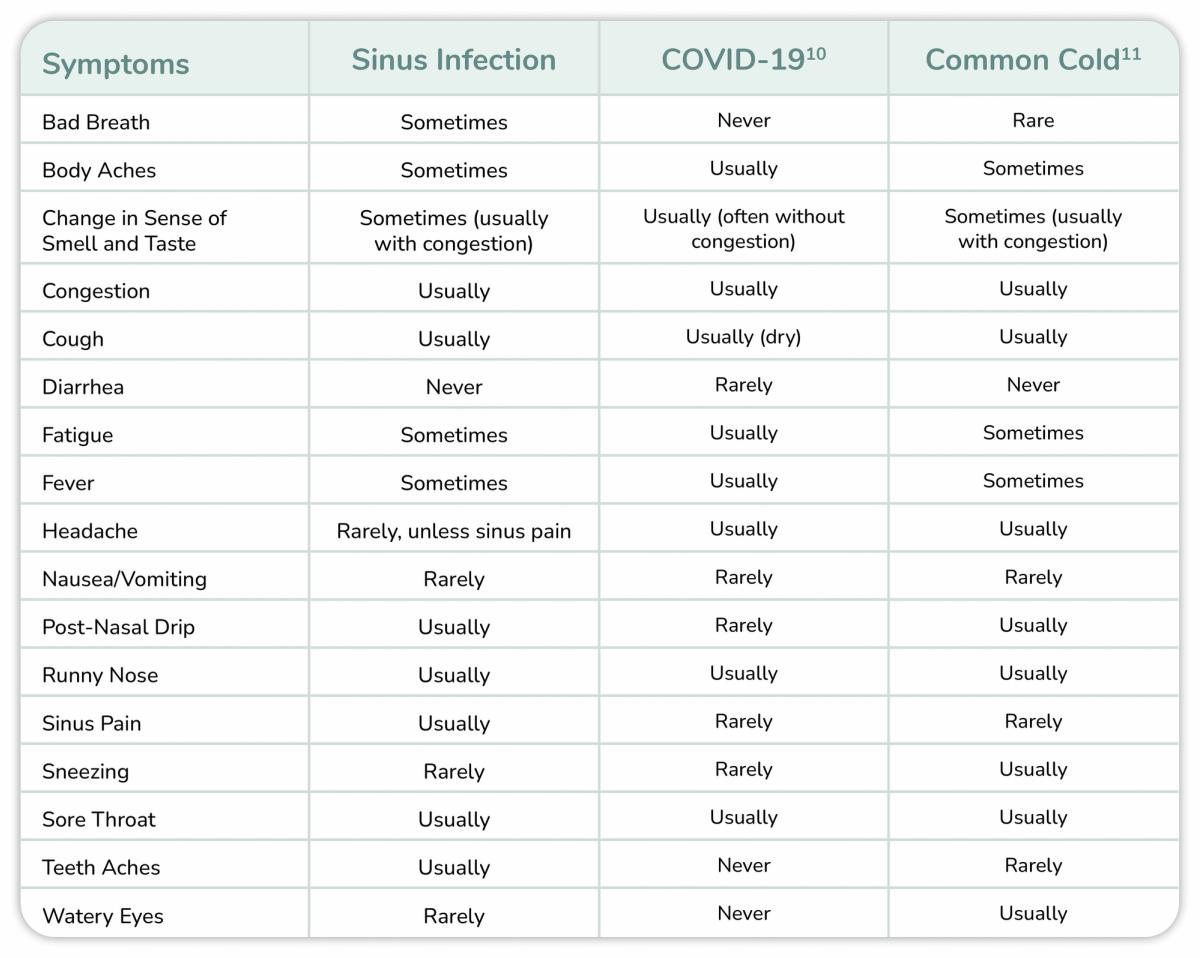
Is a sinus infection, COVID-19 or a cold more contagious?
Viruses cause COVID-19, colds, and sinus infections. In some instances, sinus infections can also be caused by bacteria. Viruses and bacteria can spread through the air when someone coughs or sneezes and can be transmitted through shaking hands or touching surfaces that have been contaminated.
The viruses and bacteria that cause these conditions are highly contagious. The main difference is that COVID-19 has the most potential to cause serious illness in the infected.12
What to do if you suspect you have COVID-19
If you are experiencing symptoms of COVID-19, the first step is to isolate yourself from others to prevent spreading the virus. The next step is to get tested for COVID-19. If you test positive, you are the most contagious in the first five days and the Center for Disease Control (CDC) recommends:13
Stay home and separate from others as much as possible for at least five days.
Wear a high-quality mask if you must be around others at home and in public.
Do not travel.
Use a separate bathroom if possible.
Take steps to improve ventilation at home if possible.
Don’t share personal household items, like cups, towels and utensils.
Seek immediate medical attention if you exhibit any of the following emergency warning signs:14
Trouble breathing.
Persistent pain or pressure in the chest.
New confusion.
Inability to wake or stay awake.
Pale, gray, or blue-colored skin, lips or nail beds, depending on skin tone.

Quality, affordable telehealth services with medications prescribed online.
RedBox Rx is focused on improving healthcare access at affordable prices. We offer convenient online doctor consultations with fast, discreet shipping on medications to your door.
Create an AccountCan COVID-19 cause a sinus infection?
A sinus infection is the body’s reaction to inflammation in the sinuses that causes them to fill with fluid. The COVID-19 virus can lead to a sinus infection.15
Can you have COVID-19 and a sinus infection at the same time?
Sinus infections are often caused by viruses, including COVID-19. Therefore, it is possible to have COVID-19 and a sinus infection at the same time.16
How do treatments compare for a sinus infection, COVID-19 and a common cold?
A sinus infection, COVID-19 and a common cold are all caused by viruses or bacteria and have similar symptoms. Many treatments overlap for these conditions with some differences.
Treatments for a sinus infection include:17
Saline nasal spray.
Nasal corticosteroid sprays. Fluticasone (Flonase®)
Decongestants. Guaifenesin (Mucinex®), oxymetazoline (Afrin®)
Antihistamines/Allergy medications. Levocetrizine (Xyzal®)
Pain relievers. Acetaminophen (Tylenol®), ibuprofen (Advil®)
Antibiotics (for bacterial infections only). Amoxicillin (Amoxil®), doxycycline (Vibramycin®), levofloxacin (Levaquin®)
Most people with COVID-19 have mild symptoms that can be treated with rest and over-the-counter medicines like acetaminophen and ibuprofen. For individuals at risk for developing serious complications from COVID-19, there are antiviral medications available, including:18
Nirmatrelvir/ritonavir (PAXLOVID™)
Molnupiravir (LAGEVRIO™)
Remdesivir (VEKLURY®)
There is no cure for the common cold, however, there are some treatments that can relieve symptoms, including:19
Stay hydrated.
Rest.
Saltwater gargle for a sore throat.
Saline nasal spray.
OTC pain reliever.
OTC decongestants and antihistamines.
How to lower your risk of getting or transmitting an infection
You can reduce your risk of illness by practicing the following prevention tips:20
Keep immunizations up to date.
Wash your hands often.
Use antibiotics only for infections caused by bacteria. Viral infections cannot be treated with antibiotics.
Stay alert to disease threats when traveling or visiting underdeveloped countries. Seek advice from a reliable source, such as the WHO or the CDC, if you are going to areas of moderate-to-high disease risk.
Acquire healthy habits such as eating well, getting enough sleep, exercising, and avoiding tobacco and illegal drug use.
How RedBox Rx can help
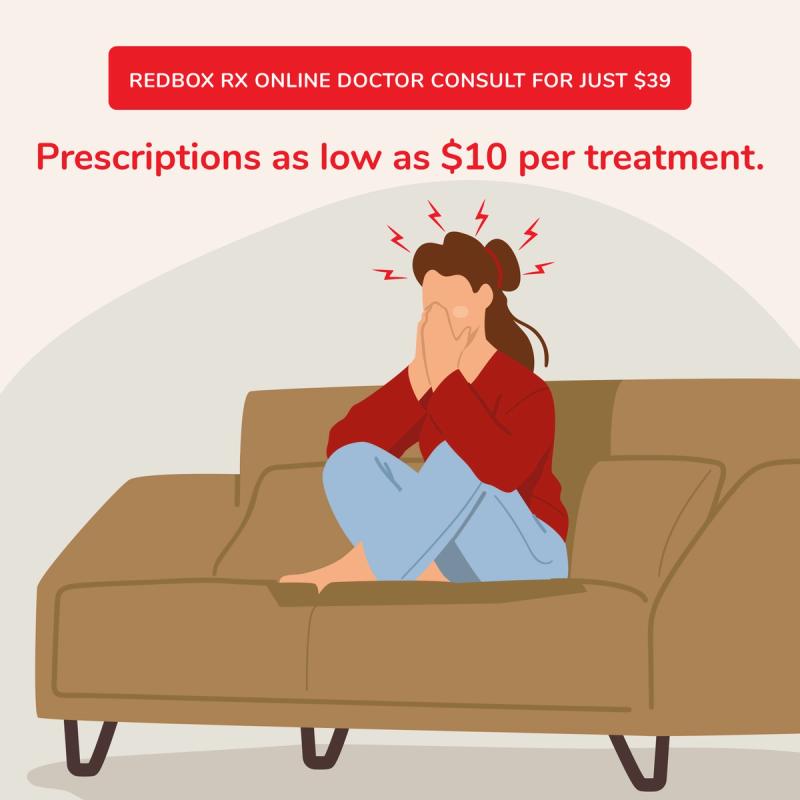
RedBox Rx provides convenient, affordable telehealth services and prescription treatments for sinus infections.
Benefits of RedBox Rx include:
Transparent, affordable, medications starting at $10 per treatment.
$39 online consultations with a U.S. licensed medical professional.
No membership fees. No insurance required. HSA and FSA eligible.
Free standard shipping or expedited/overnight available.
Create an account and start your treatment today with an easy, quick online assessment for sinus infections.


